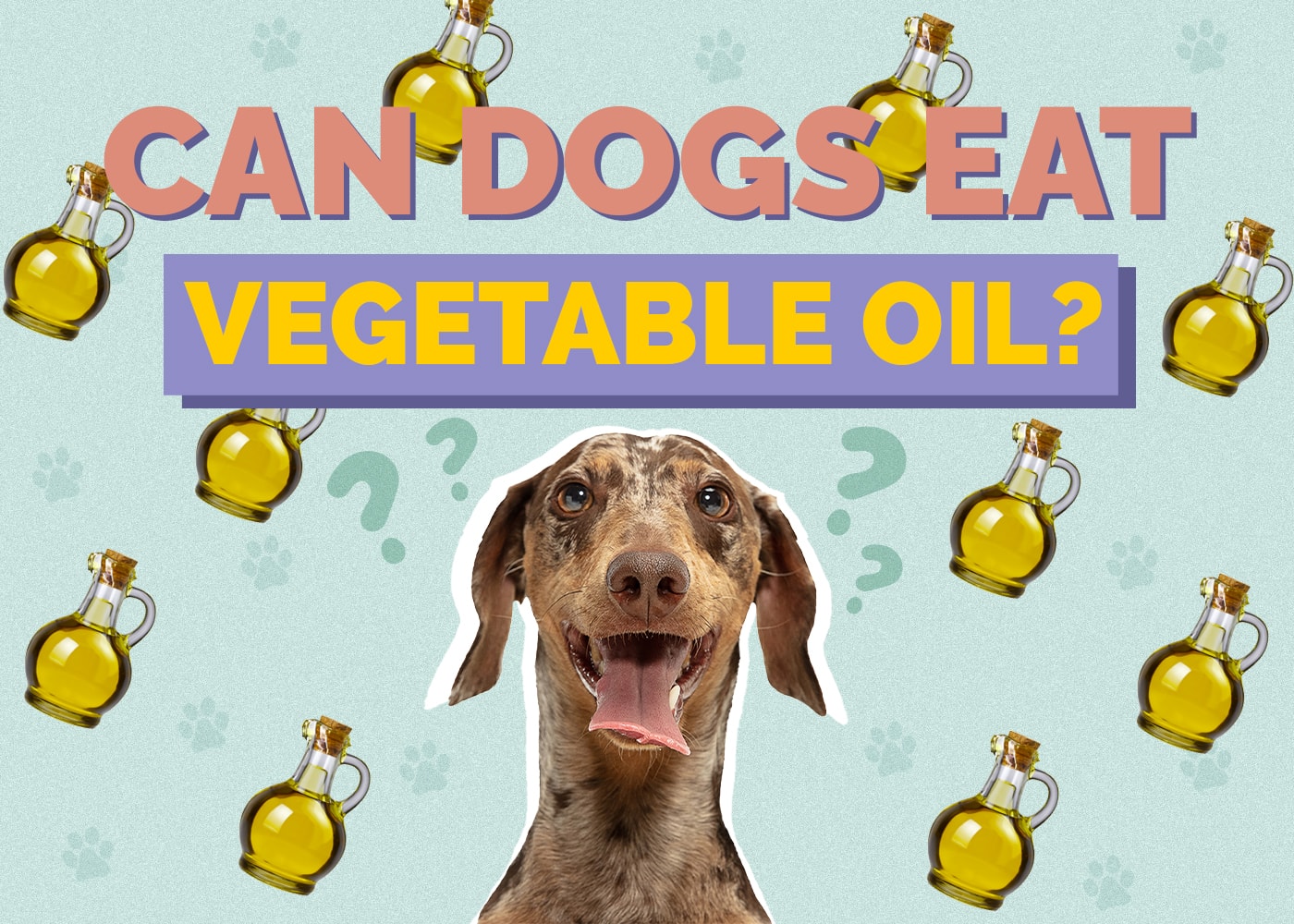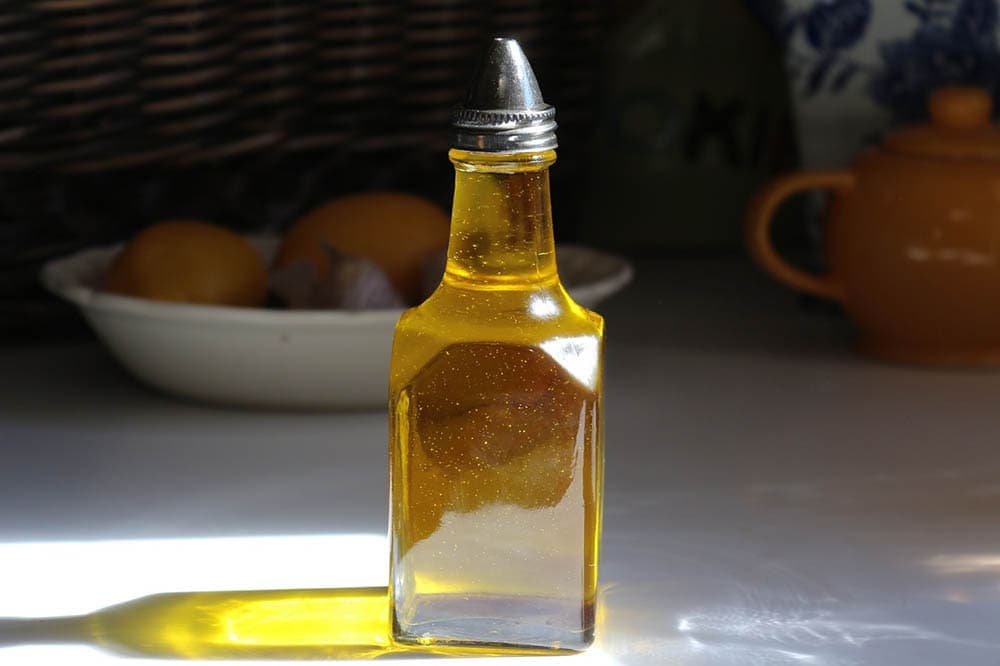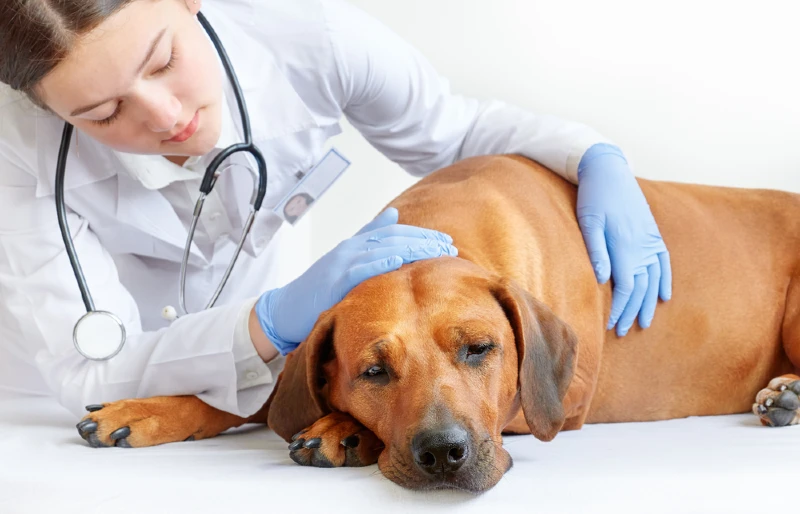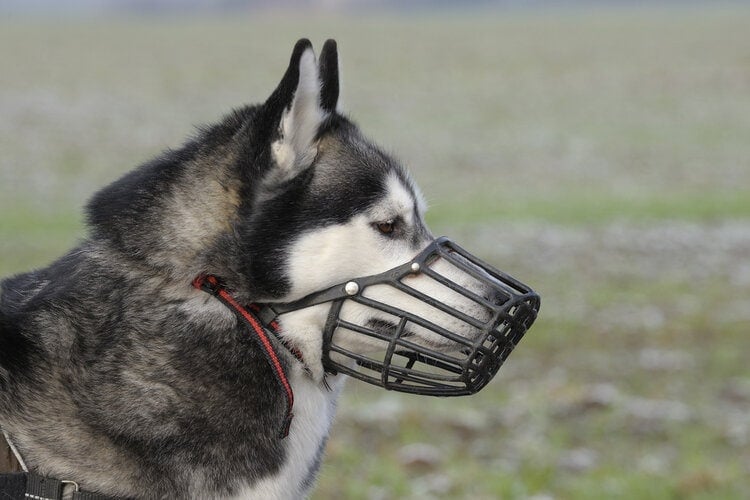Can Dogs Eat Vegetable Oil? Vet Approved Facts & FAQ

Updated on

Have you ever wondered if you can share some vegetable oil with your furry friend? We humans use an incredible amount of vegetable oil each year—worldwide vegetable oil output was equivalent to more than 200 million metric tons last year alone!1 You probably already know that canines need healthy fats in their diets—but does vegetable oil fall in the category of being doggy-safe? It’s a good question, especially if you’re conscious about your dog’s diet.
The answer is yes, dogs can eat vegetable oil, but as always, the devil is in the details. So, let’s dive into the topic and find out how healthy it is for your bestie.
Is Vegetable Oil Safe for Dogs to Eat?
First things first, let’s establish that vegetable oil is not toxic to dogs. So you don’t need to worry if your dog has just licked up a small quantity of spilled oil. Vegetable oil is usually made from canola or sunflower oil, but can refer to other plant oils. In fact, some commercial dog foods contain vegetable oil as a source of fat. These products meet pet food regulations and are consumed by hundreds of thousands of canines each year—so your Fido is in good company.
But, here’s the deal. Dogs are facultative carnivores and it’s better—and more natural—for them to eat animal-sourced fats. Your bestie needs a balanced diet that includes fat, protein, and carbs in the right proportions. Too much of a good thing—such as an overabundance of one macronutrient—will inevitably lead to health issues. Dietary balance is key for dogs: just like in humans.
When we give our dogs people food—even if it’s not truly toxic for them—we still risk spreading our food-related problems to them. That’s why a major problem for domestic animals is obesity. It’s one of the biggest issues for canines in the United States. So, the question is, how much vegetable oil should you give your four-legged buddy? And what are the health implications of feeding them too much or too little? Let’s find out.

How Much Vegetable Oil Can Dogs Eat?
Dogs can consume a small amount of vegetable oil without any harm. However, if you go overboard, it can lead to a calorie overload and make your canine companion gain weight. Obesity poses a significant problem for our beloved dogs, and it can cause various health issues like joint problems, diabetes, and heart disease.
If for some reason, you feel you have to give your dog vegetable oil, you can safely give your dog a teaspoonful of vegetable oil per 30 pounds of body weight. This is an okay amount for most dogs. But there’s really no need to supplement their food with vegetable oil. Keep in mind that this is just a guideline, and you should consult your vet before making any significant changes to your dog’s diet.
Is Vegetable Oil Healthy for Dogs?
Vegetable oil is a source of unsaturated fats, which are good for dogs in moderation—just don’t go overboard. These fats can help maintain a healthy coat, boost their immune system, and promote brain development. This is why these oils often make their way into pet foods and snacks—in limited quantities. However, feeding your dog too much vegetable oil can lead to digestive issues like diarrhea, vomiting, and pancreatitis. Basically, canine bodies can’t handle a huge influx of oil in one go. If your dog drinks a large quantity of oil in one sitting—you need to get in touch with your vet.
It’s worth noting that some oils such as coconut oil, and flaxseed oil, have additional health benefits for dogs. But always remember, keep it to a small amount—and introduce them slowly. For example, coconut oil can help soothe skin irritation and improve digestion. Some people like to keep it on hand to rub into any hot spots or irritated and inflamed areas on their dog’s body. Flaxseed oil is a source of omega-3 fatty acids, which can reduce inflammation and support brain health. So, you might want to try these—but only with your vet’s permission.

How to Incorporate Vegetable Oil in Your Dog’s Diet
If you want to add vegetable oil to your dog’s diet, make sure you select a high-quality vegetable oil, which is free of additives and preservatives. You should begin by introducing a small amount of vegetable oil and gradually increase it over a few days. Ensure you use a measuring spoon to make sure you do not overdo it. Do not use vegetable oil to replace anything in your dog’s existing diet. It should only be used as a supplement to your dog’s diet—under the direction of your veterinarian. You should monitor your dog’s reaction to the oil and stop feeding it if you notice any digestive problems.
Is Margarine Safe for Dogs?
In order to imitate butter, margarine is made out of a variety of vegetable oils. In spite of the fact that margarine does not contain any dairy, it can contain some milk products in the form of whey or lactose. There are no toxic ingredients in margarine, but there are a lot of additives and preservatives that are not good for dogs. This is a highly processed food. Man-made foodstuffs are not easy on canine stomachs. Margarine contains vegetable oil—which, as we know, is not great for dogs in large amounts.
Your dog may get an upset stomach even if they only eat a little bit of margarine. However, if they accidentally eat the whole tub, they will most likely become quite sick, so you should call your veterinarian.

Conclusion
In conclusion, dogs can eat vegetable oil in moderation, and it can have some health benefits. That’s why you find it in dog food. However, it’s crucial to consult your vet before making any significant changes to your dog’s diet. Dogs aren’t designed to handle human food. Remember, a balanced diet is key to your pup’s well-being and longevity. So, ensure that you’re feeding your dog a diet that contains the right amount—and right source—of fats, proteins, and carbs to keep them in tip-top shape.











